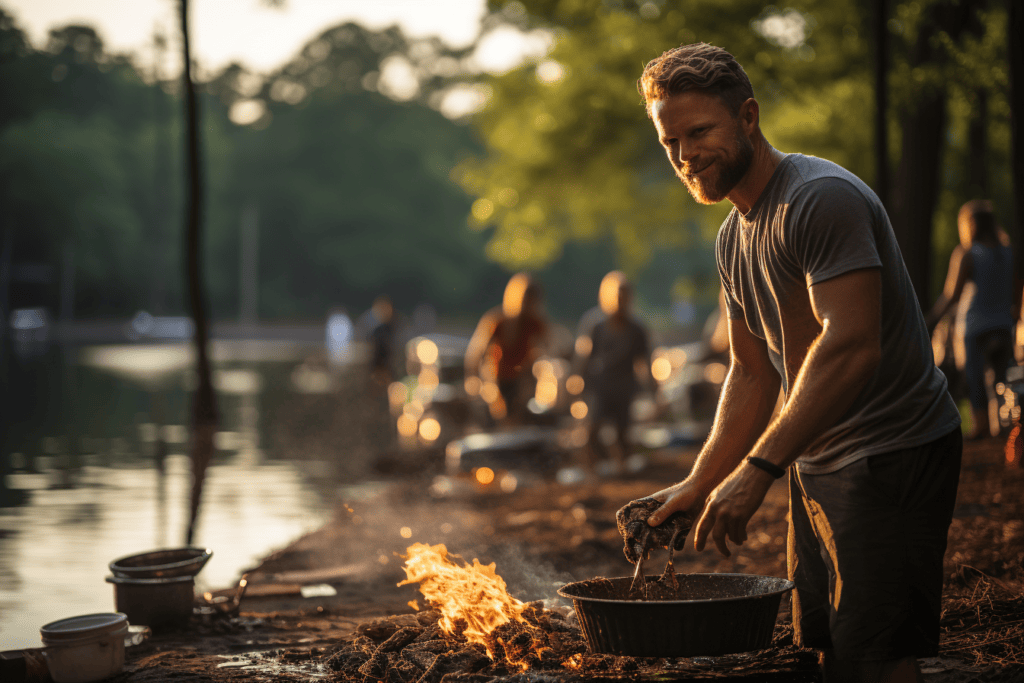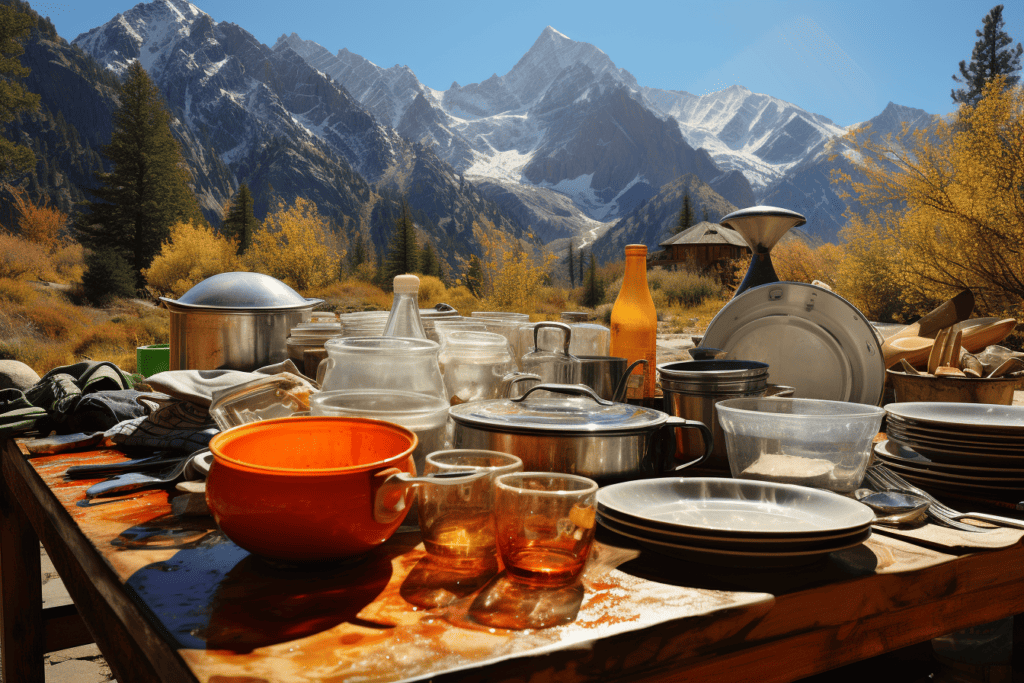The Savvy Camper’s Guide to Keeping Cookware Clean in the Wilderness
Greetings, fellow outdoor enthusiasts and survivalists!
Ready to head out on your next camping trip but worried about how to keep your pots, pans, and utensils sparkling clean while roughing it in nature? Don’t sweat it, friend – The Savvy Survive your go-to hub for wilderness wisdom, has got you covered.
As a seasoned camping fanatic, I know firsthand how frustrating it can be when your cookware gets grimy and gross while roughing it in nature. Nothing spoils an epic camping feast quicker than biting into some charred burnt residue! Yuck!
Not to worry though, I’ve got you covered. In this comprehensive guide from The Savvy Survive, I’ll share all my best pro tips for keeping your camp cooking gear sparkling clean, even when you’re miles from civilization. With just a bit of smarts and some essential supplies, you’ll be whipping up scrumptious backcountry cuisine in spotless pots and pans on every adventure. Let’s get cookin’!
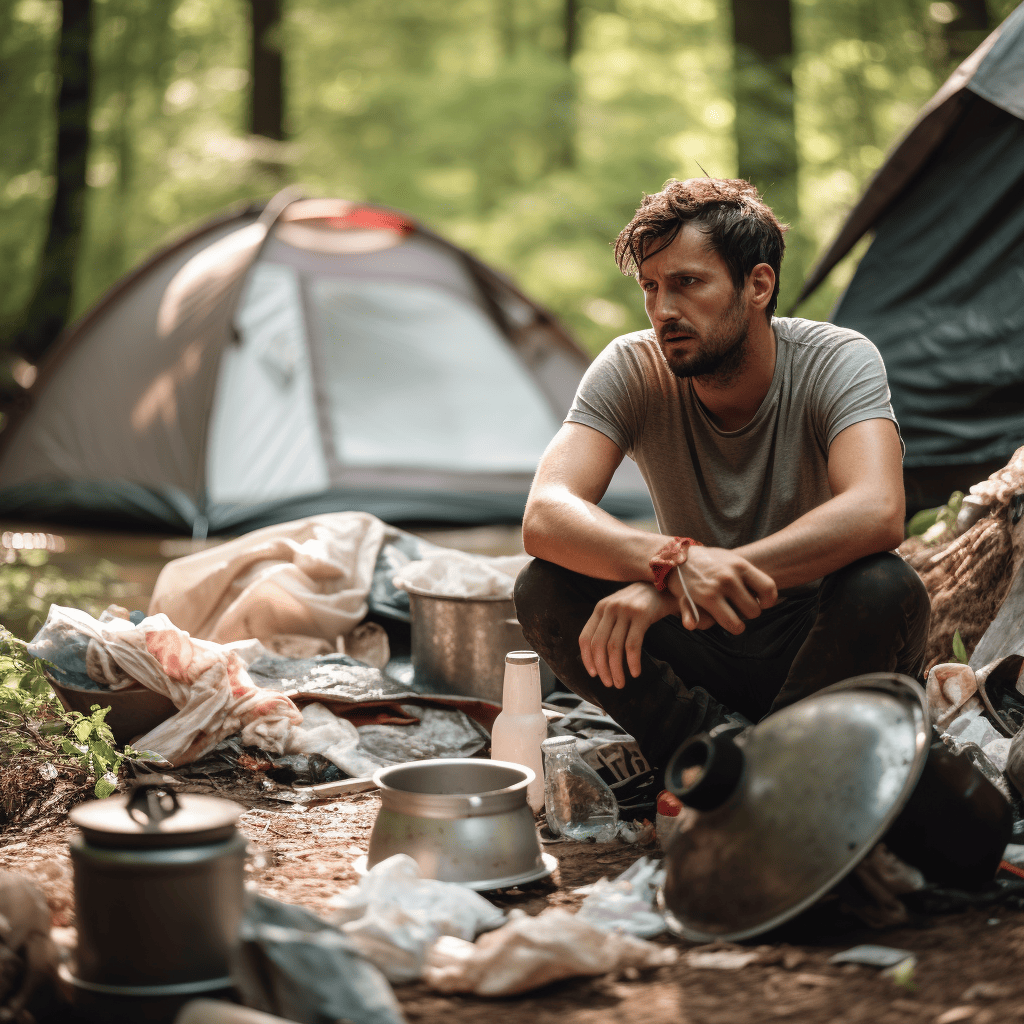
Why Bother Keeping Clean Camp Cookware?
I know after a long day hiking to your remote campsite, washing dishes can be just about the last thing you want to do. But putting in the effort to clean your pots, pans, and utensils properly is so important for a few key reasons:
- Food safety – Leftover grease, grime, and food bits are breeding grounds for bacteria that can make you sick. Yuck! The last thing you want on a camping trip is a bad case of food poisoning.
- Performance – Cookware coated in layers of burnt food just doesn’t cook as evenly or efficiently. Keeping your gear clean helps it work like new.
- Longevity – With regular cleaning, your camp cooking equipment will last for many wilderness adventures to come.
- Leave No Trace – Proper cleaning helps minimize any impact on the environment and wildlife around your campsite.
Trust me, taking a few minutes to clean up after meals is worth it for safety, great-tasting food, and responsible camping. The wilderness is our playground – let’s treat it right!
Camp Cookware Cleaning Supplies to Pack
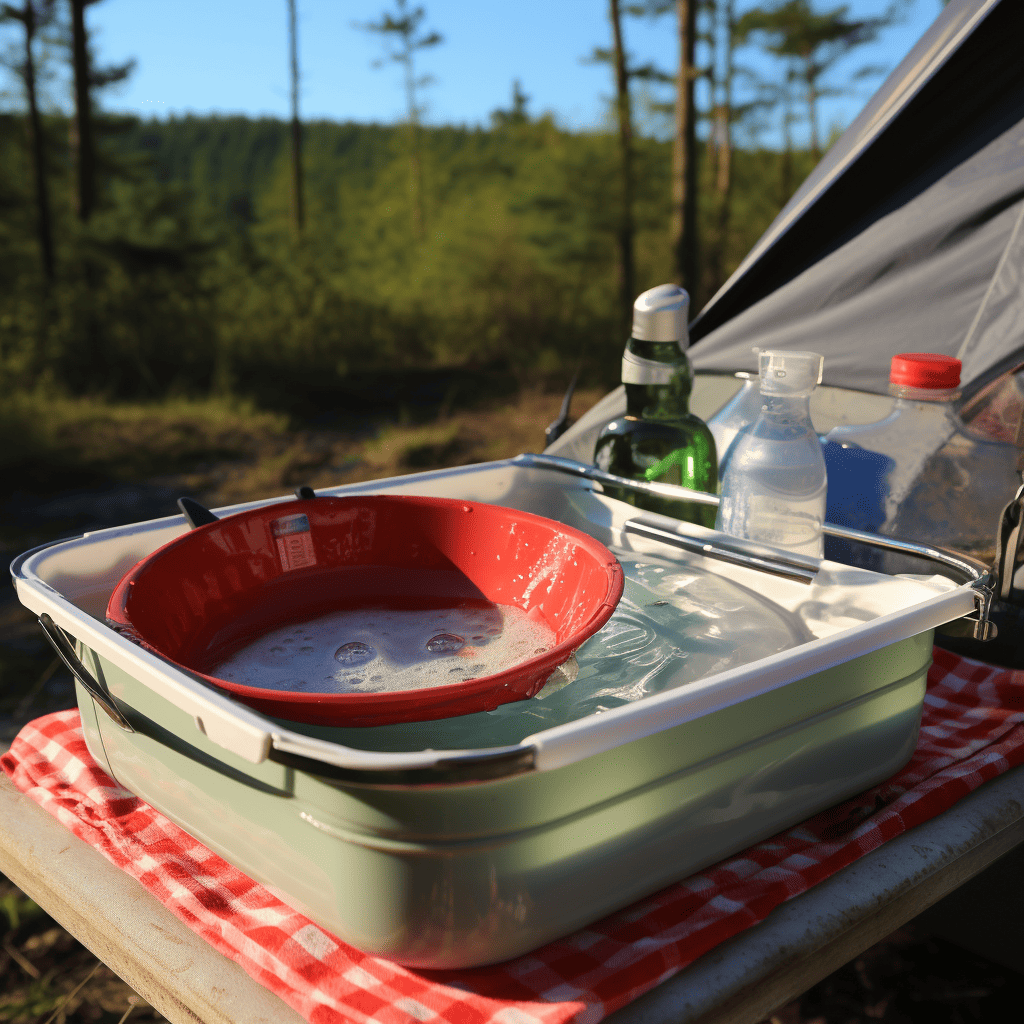
Now that you’re convinced of the importance of clean cookware, let’s talk about what cleaning supplies you’ll want to pack for your next camping trip.
Here are the basics I always bring in my backpack or car camping bin:
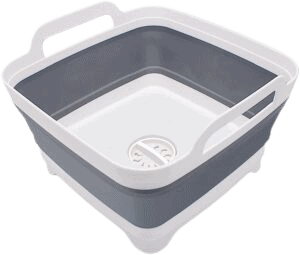 | Collapsible camping sinks | They are a practical and space-saving option for outdoor enthusiasts. They can be easily folded up and stored when not in use, making them perfect for camping, picnics, and other outdoor activities that require a convenient and hygienic way to wash dishes or clean up. |
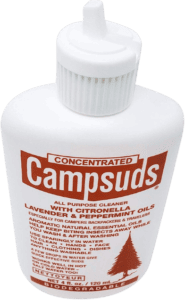 | Biodegradable dish soap | Look for a small travel-size bottle that's not only eco-friendly but portable too. |
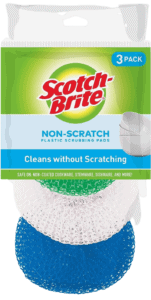 | Scrub pad | I'm a big fan of the Scotch-Brite non-scratch scrub pads. They can handle stuck-on food but won't damage non-stick surfaces. |
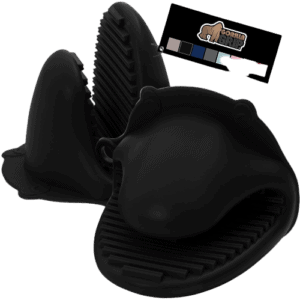 | pot gripper | A silicone gripper helps handle hot cookware safely when washing. |
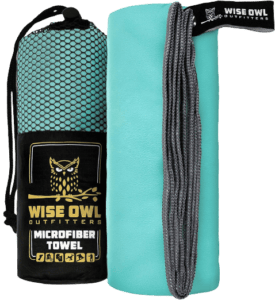 | Camp towel | Pack a lightweight microfiber camp towel that can dry cookware and hands efficiently with just a little water. |
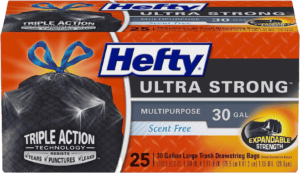 | Trash bags | Bring along a small trash bag for food scraps and used paper towels when cleaning up. |
With just these few simple items, you’ll be equipped to get your camp kitchen sparkling – no matter how remote the locale. Now let’s get into the nitty-gritty of pots, pans, and dishes cleaning methods.
Clever Ways to Clean Camp Pots and Pans
Pots and pans take the most abuse when cooking over a campfire or camp stove. Here are my best tips for conquering grease and restoring shine:
Start With a Quick Wipe
After cooking in a pot or pan, it’s a good idea to give it a quick once over with a paper towel or soft cloth while it’s still warm. This will remove excess oil and any loose food debris.
Choose Your Cleaning Weapon
For stuck-on gunk, a non-scratch scrub pad is my go-to for removing residue without damaging surfaces. I also like using a stiff nylon brush or ball of aluminum foil to gently loosen any burnt bits on the bottom.
Harness the Power of Ashes
Here’s a clever campsite trick I’ve learned over the years – ashes from your fire contain lye which helps cut through grease. Just sprinkle some ashes into your cookware with a little water and scrub to get a easy cleaning boost.
Whip Up a Baking Soda Paste
For really stubborn stains in cast iron or aluminum pans, make a paste with baking soda and water. Apply and let sit for 15-30 minutes before scrubbing and rinsing. This is how I erase all evidence of those super smoky campfire meals!
Follow these tips and even the crustiest Dutch oven or frying pan doesn’t stand a chance.
Dishwashing 101: Keeping Camp Plates and Utensils Clean
Washing dishes in the wilderness requires some creativity and know-how. Check out my dish cleaning tips:
Scrape Away Leftovers
Before washing plates or utensils, scrape off as much leftover food as possible either into your trash bag or directly into the fire. This will make washing much easier.
Use Cold Water Sparingly
To conserve water, fill a tub or pot with just enough cold water to get your dishes wet. Scrub with a small amount of biodegradable soap, then rinse. Repeat if needed.
Prioritize Cleanest to Dirtiest
I like to wash my cleanest dishes first in fresh water, then tackle the grimiest plates and utensils last using dirtier wash water. This prevents spreading food all around.
Let Nature Dry Your Dishes
Rather than towel drying, place your washed dishes on a rock or stump in the sun to air dry. This prevents water spotting for sparkling clean diningware.
With these steps, you can become a wilderness dish washing master – and leave no trace at your campsite.
Conquering Cast Iron Cleaning at Your Camp Kitchen
Cast iron skillets are camp cooking staples thanks to even heating and natural nonstick properties when seasoned properly. But they require some special care when it comes to cleaning.
Here are my cast iron cleaning tips to keep them in peak outdoor cooking condition:
Don’t Soap It Up
The seasoned surface of cast iron can be damaged by dish soap. Instead, scrub with a brush and hot water only. If needed, use a pinch of salt as a gentle abrasive.
Dry Thoroughly
Since cast iron is prone to rust, dry immediately and thoroughly after washing. Place over low heat or in the sun to fully evaporate all water.
Re-season Regularly
After each camping trip, give your cast iron a fresh layer of seasoning at home by coating with a thin layer of oil and baking upside down for an hour.
Follow this cast iron care routine and your trusty skillet will deliver many memorable campfire meals.
Special Considerations for Cleaning Non-Stick Camp Cookware
Non-stick pots and pans make cleanup a breeze. But the coating also requires some specific care. Here’s how to wash non-stick camp cookware correctly:
Use a Soft Sponge
Avoid abrasive scouring pads or brushes which can scratch and damage the non-stick surface over time. A soft sponge keeps it intact.
Skip the Steel Wool
Similarly, stay away from steel wool when cleaning non-stick cookware. Reach for a nylon brush or ball of foil instead to safely remove stuck-on food.
Let It Soak
For stubborn baked-on messes, fill your pot or pan with hot soapy water and let soak for 30 minutes to loosen residue before scrubbing. The non-stick will thank you!
Treat your non-stick camp cookware gently and it will deliver easy cleanup for many wilderness meals.
Cleaning Camp Cookware Without Running Water
For backcountry adventures without access to running water, cleaning cookware requires some creative problem solving. Here are my best off-the-grid cleaning methods:
Boil Water Method
Heat a pot filled halfway with water to a rolling boil for 5-10 minutes. This hot bubbling water helps loosen burnt-on food for easier scrubbing.
DIY Camp Sink
Dig a hole and line with a durable plastic bag to create your own camp “sink” for washing. Fill with small amounts of heated water as needed.
Sand Scrub
Use fistfuls of sand as an abrasive scrubber if you don’t have a scrub pad. Just be sure to rinse thoroughly so no grains end up in your food later.
Don’t let a lack of running water stop you from keeping cookware clean on your next backcountry escape. Just remember – necessity is the mother of invention!
Top 5 Cookware Cleaning Tips for Beginner Campers
If you’re just getting into camping, washing dishes can feel daunting without your regular kitchen setup. Keep these beginner tips in mind:
- Go biodegradable – When selecting dish soap for the outdoors, be sure to choose a biodegradable formula that won’t harm the environment.
- Use cookware wisely – The easier your cookware is to clean at home, the easier it will be to clean when camping too.
- Wash right after eating – Don’t let food dry on cookware. Wash as soon as possible after cooking and eating.
- Make a wash station – Set up an organized washing area with bins for soapy water, rinsing, and drying.
- Store properly – Keep cookware covered to avoid collecting dirt or bugs after cleaning up from a meal.
Stick to these basics and you’ll pick up the nuances of camp cookware cleaning in no time!
Common Camp Cookware Cleaning Conundrums Solved
Even seasoned camping vets can run into tricky cookware cleaning challenges now and then. Here are some of the most common questions I get:
How do you clean away stubborn black soot on pots and pans?
Let the cookware soak for 30 minutes in hot water mixed with baking soda and salt. This magical combo lifts away the toughest burnt-on gunk.
What’s the best way to clean a dirty camp stove or grill grate?
Use a brush made specifically for camp stoves to scrub away food debris. Then wipe with an oily paper towel to keep it seasoned.
Should you clean cast iron with soap at a campsite?
It’s best to skip the soap which can damage seasoning. Instead, scrub with hot water, salt, and a brush. Wipe dry immediately.
How can you thoroughly clean inside a tall narrow water bottle?
Fill halfway with hot soapy water, cover opening and shake vigorously, then rinse multiple times with clean water.
See? With a little know-how, you can handle even the trickiest camp cookware cleaning quandaries!
Remember the Campsite Cleanup Routine
Cleaning your cookware after meals is just one part of leaving a pristine campsite. Be sure to also:
- Put out campfire fully with water until cold
- Pack out all trash – no burying or burning
- Scatter any fire ring rocks
- Check for forgotten items before heading out
Taking just a few minutes to clean up properly makes a huge difference in preserving our beautiful wilderness areas. The next campers will thank you!
And there you have it, survivalists – all my top tricks from The Savvy Survive for camp cookware clean enough to eat off. I hope this guide helps make your next backcountry kitchen masterful and mess-free!
Remember, leave it cleaner than you found it to preserve the wilderness we know and love. Have any other clever camp cleaning hacks? Let me know! I’m always seeking new ways to make outdoor chores a breeze.
Now get out there, get cooking, and keep it clean, savvy survivalists. The mountains (and your grumbling stomach) await! And be sure to check TheSavvySurvive.com for more expert tips to make your camping trips simple and smooth. Stay wild!

